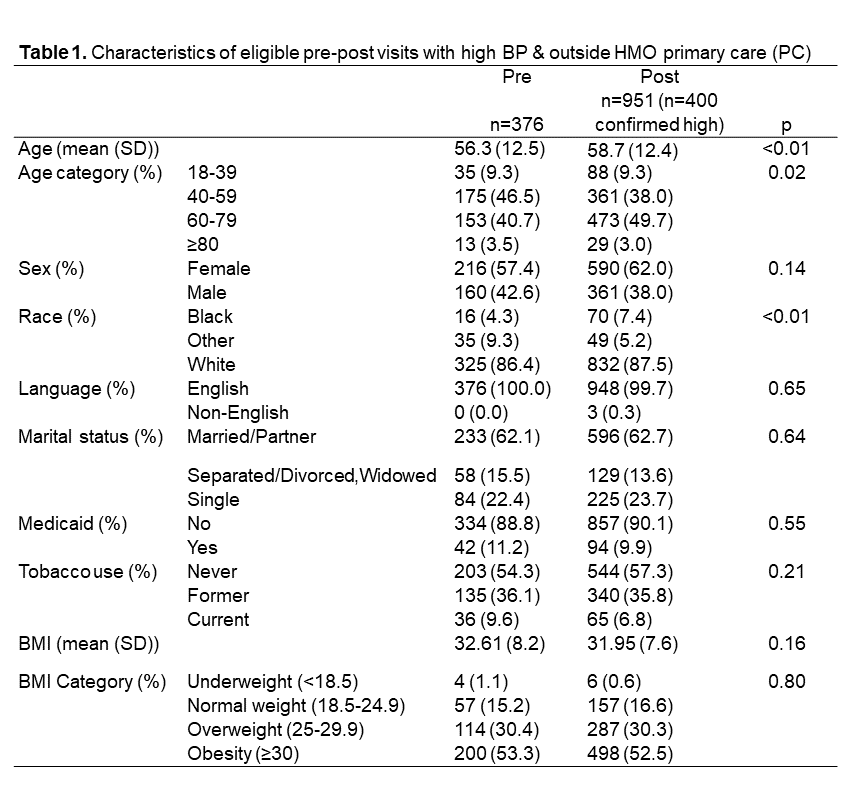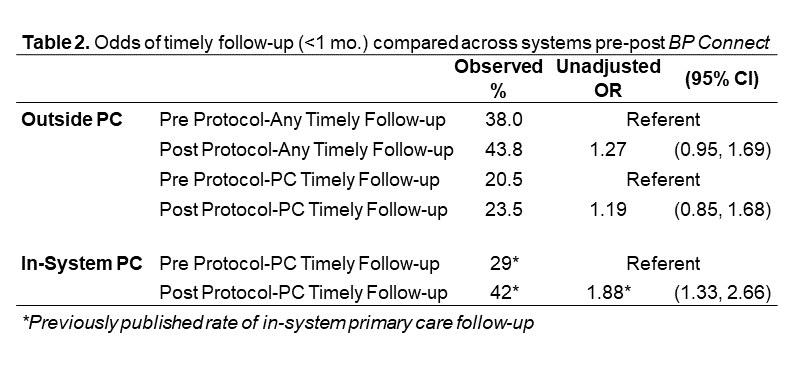Session Information
Date: Sunday, November 7, 2021
Title: Measures & Measurement of Healthcare Quality Poster (0623–0659)
Session Type: Poster Session B
Session Time: 8:30AM-10:30AM
Background/Purpose: To address high blood pressure (BP), target of two ACR quality measures and the leading modifiable risk factor for cardiovascular disease, we previously developed BP Connect, a brief staff-driven protocol for rheumatology clinics. Across 28,000 visits, BP Connect cut rates of high BP visits in half and doubled timely in-system primary care (PC) follow-up [Adj. OR 2.0, (1.4-2.9)]. Yet many patients receive PC and rheumatology care in separate health systems. This study aimed to compare rates of timely outside system PC follow-up after high BP at rheumatology clinics before and after BP Connect implementation.
Methods: This post-hoc study examined pre-post rates of timely follow-up of high BP after BP Connect implementation among patients whose PC was in an outside Health Maintenance Organization (HMO). All adult patients with high rheumatology clinic BP and PC in that HMO were eligible. BP Connect’s EHR prompts ask rheumatology medical assistants, nurses, and schedulers to: Check, re-measuring high BP ( >/=140/90), Advise CVD risk, and Connect patients to timely PC follow-up (< 1 mo per guidelines) using automated EHR orders in < 4 min. EHR follow-up orders prompt direct scheduling for patients with in-system PC, while outside HMO patients receive standardized recommendations printed on their after visit materials without direct scheduling. Staff steps were reinforced via monthly individual staff audit-feedback for the 6 mo. study period (late 2015-6), and then via email. For this study, we obtained outside EHR data on the next HMO PC visit with BP recorded after an eligible index rheumatology visit to evaluate rates and odds of timely follow-up pre-post using logistic regression. We compared results to our previously published rates and unadjusted OR for timely in-system follow-up.
Results: Across 1,327 rheumatology visits with high BP and outside HMO PC (2013-19), 951 occurred after 2015 BP Connect implementation and 400 had confirmed high BP. Differences in the post-implementation cohort included older age (58.7 vs 56.3) and more Black patient visits (7.4 vs 4.3%; Table 1).
After BP Connect implementation, among 400 visits with a confirmed high BP and outside HMO PC, any timely follow-up within 1 mo. increased modestly from 38 to 43.8%, and PC follow-up rose from 20.5 to 23.5% (Table 2). This contrasts with our prior published increase from 29 to 42% using a stricter 28-d. definition for in-system PC follow-up. Odds of timely BP follow-up among HMO PC patients changed insignificantly, [Any: OR 1.27, (CI 0.95, 1.69); PC: OR 1.19, (CI 0.85, 1.68)], vs. our prior published unadjusted OR of 1.88 (CI 1.33, 2.66) for timely in-system PC follow-up with direct scheduling.
Conclusion: Findings showed that in contrast to our prior published improvements for timely in-system PC follow-up with direct scheduling, BP Connect improvements were not significant for timely follow-up when PC was in an outside system. Printed patient instructions in after visit materials did not appear as effective as direct scheduling which patients with in-system PC received. Next steps include piloting a direct scheduling hotline with the outside HMO to improve timely BP follow-up and outcomes for rheumatology patients who receive PC in other systems.
To cite this abstract in AMA style:
Bartels C, Hanlon B, Messina M, Ferguson S, Ramly E. Follow-up Scheduling Appears Essential for Success of Rheumatology High Blood Pressure Protocol Across Health Systems [abstract]. Arthritis Rheumatol. 2021; 73 (suppl 9). https://acrabstracts.org/abstract/follow-up-scheduling-appears-essential-for-success-of-rheumatology-high-blood-pressure-protocol-across-health-systems/. Accessed .« Back to ACR Convergence 2021
ACR Meeting Abstracts - https://acrabstracts.org/abstract/follow-up-scheduling-appears-essential-for-success-of-rheumatology-high-blood-pressure-protocol-across-health-systems/


